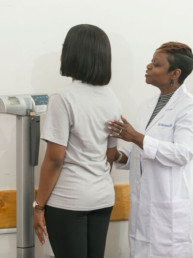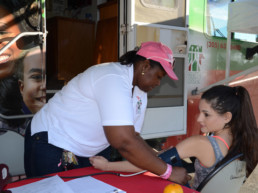Overview
Primary Healthcare is the day-to-day care needed to protect, maintain or restore good health. For most people, it is both their first point of contact with the health care system and their most frequently used health service. Primary Healthcare coordinates or integrates care, regardless of where the care is delivered and who provides it.
Our initial research in the area of Primary Healthcare indicated that there were a fair percentage of adults who had a routine check-up in the course of a year in Miami Gardens. In spite of this, our data also demonstrated that many residents who delay care do so until they have serious health problems. It was noted that delay in medical care/avoidance is significantly affected by a resident’s perception of how they will be treated by the medical office/doctor and fears of being judged. People may also delay or avoid testing or treatment because they fear stigma that is often associated with certain diseases or conditions. The delay in health seeking behavior is particularly visible in certain zip codes where a variety of additional barriers create delay including: cultural barriers including a general mistrust of the health care system; not knowing where to go for care/services in the community; not knowing the warning signs and symptoms of certain diseases (i.e. cancer) and at what point should they seek care; lack of understanding among consumers concerning their health insurance plans and benefits; and generally not feeling confident about their ability to navigate our health care delivery system. Through our community assessment process, we know that at the root of many of these barriers is the need for greater health literacy on common illnesses and preventive care.
To address these challenges and barriers, LHMG prioritized the following strategies to create a more health literate community and increase access to Primary Healthcare services.

Strategies
- Improve health literacy of Miami Gardens residents across the life cycle.
- Conduct a yearly Take Your Loved One to the Doctor Campaign to inspire the community to be proactive with their health and increase the possibility of early diagnosis when the chance of successful treatment is better.
- Promote and facilitate access to Primary Healthcare facilities and services for Miami Gardens residents.
- Increase continuity of care/community support for breastfeeding by implementing a Breastfeeding TouchPoint Program that engages 100 women yearly in breastfeeding training, coaching, and support services.
- Increase referral and access to community-based health programs by promoting the use of appropriate and locally available programs (e.g., Diabetes Prevention Program, Chronic Disease Self-Management Program, tobacco cessation services, Food Nutrition Education Programs, Special Supplemental Nutrition Program for Women, Infants, and Children, access to food banks, and assistance with housing or job training).

Community Clinical Linkages
Working with University of Miami, the SBIRT Implementation Project focuses on building the capacity of six (6) community agencies to implement SBIRT in ways that are sustainable, feasible, and that ultimately lead to the improved health and wellness in the City. SBIRT (Screening, Brief Intervention, and Referral Intervention and Referral to Treatment) is an evidence based intervention used to identify and intervene early with individuals who use alcohol and substances in ways that increase their risk of physical health, mental health, or social problems. Currently, the six organizations participating in the project are: Concerned African Women; Federation of Families; Fresh Start; Optimal Health; Center for Family and Child Enrichment; and Community for Life.
Breastfeeding
In partnership with Jessie Trice Community Health System, LHMG is implementing a Breastfeeding TouchPoint Program focused on increasing continuity of care/community support for breastfeeding. The program engages 100 women yearly in breastfeeding training, coaching, and support services. The programs works to incorporate services into existing community support services (early care and education centers, community health centers, home visiting programs, etc.); establish lactation support services (support groups, walk-in clinics, Baby Cafés) that are accessible and culturally appropriate; and provide breastfeeding support training to health care providers, community health workers, peer support providers, who work with mothers and babies.
Take your Loved One to the Doctor Campaign
The LHMG Take Your Loved One to the Doctor (TYLOD) Campaign’s goal is to inspire the community to be proactive with their health and increase the possibility of early diagnosis when the chance of successful treatment is better. Many people wait until there is an emergency before they go see a doctor. The Campaign highlights the importance of prevention and early detection and encourages individuals to seek regular health care. Research has shown that regular check-ups may lead to benefits including: Early detection of life-threatening illnesses and diseases; Building a good relationship with your primary doctor; Increase lifespan; Increase possibilities of treatments for any health issue; and Being informed on the latest health treatments and information. TYLOD is a year-round wellness Campaign. Community members can join this wellness movement by: Taking the Pledge or texting the word “Promise” to 797979; Sharing on social media using #LHMGpromise and challenging others to take the Pledge as well; scheduling an appointment for you and your loved one to go to the doctor.
CDC Vaccination Project
The LHMG Vaccination Campaign supports vaccination coverage for racial and ethnic groups in the City of Miami Gardens experiencing disparities in vaccination rates.
Components of the project includes a comprehensive communications campaign; education and training; community outreach; and administered vaccinations. The project’s purpose is to:
- Increase immunization rates and reduce preventable infectious diseases.
- Ensure residents of Miami Gardens are fully aware of, and have access to, appropriate immunizations.
- Educate the community on the importance of vaccination including:
- Flu spread, symptoms, prevention, and treatment;
- Flu vaccine safety and efficacy;
- Flu vaccination purpose, need, and opportunities/locations; and
- Similarities and differences between flu and COVID-19.
Free Flu Shots
Provider Locations:
Jessie Trice Community Health System
4692 NW 183rd Street
Miami Gardens, Florida 33055
(305) 623-0993
Center for Family and Child Enrichment, Inc. (CFCE)
1825 NW 167th St
Miami Gardens, FL 33056
(305) 624-7450
UHI Community Care Clinic
4745 NW 183rd St
Opa-Locka, FL 33055
(305) 620-7797
Accomplishments to Date
- Conducted a research project aimed at assessing reasons for medical delay and avoidance among Miami Gardens residents (ages 30-64); identify specific empirically-based interventions to reduce medical delay and avoidance in Miami Gardens; gain Miami Gardens specific health data; and improve health literacy with participating residents.
- Completed a community needs assessment to evaluate the needs for clinical community linkages around Diabetes Prevention Program (DPP). The assessment identified gaps that exist for uninsured patients and insured patients whose insurance company may not provide this coverage or who may be underutilizing the service
- Successfully launched a “Take Your Loved One to the Doctor” yearly campaign, which engaged over 500,000 people through various marketing strategies and secured pledges from 1,100 community members.